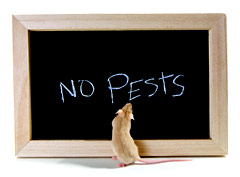Dear Umbra,
My wife and I live in a small town in Massachusetts, where I recently volunteered to head up an effort to certify our Unitarian Universalist congregation as a Green Sanctuary, an official recognition of our environmental stewardship.
In discussing potential remedies for a mouse problem with a fellow congregation member, I recounted how I recently trapped four mice in our home and transported them gingerly to fields and parking lots a couple of miles away. To my surprise, she expressed dismay. Live trapping, she advised, puts stress on the animals, upsets any existing pecking order in the locations where I release my captive rodents, and even violates a state law against the transport of wildlife. Better to kill them quickly, she said, than to make them suffer this way.
So what’s your take on this issue? Isn’t it better to give these mice (field mice, I believe) a fighting chance to reestablish themselves in the wild than to break their backs or necks in those time-honored, spring-loaded Tom-and-Jerry devices?
Didi
Harvard, Mass.

The voluntary approach.
Photo: iStockphoto
Dearest Didi,
Sounds like a question for your minister: Is a second chance at life better than dying of a broken neck? Or is heaven worth whatever means? Do mice get heaven? If so, is it an all-mice heaven, all-beings heaven, or rodent heaven? Since we do not know and may never know the answer to these theological questions, I will move forward with my ecologically based advice and say: I’m with you. A tough transition to a new environment is better than death by mousetrap.
This is not only my personal opinion, but also very likely is the answer best aligned with your Green Sanctuary program. Green Sanctuary has an Integrated Pest Management policy, which states, “This process focuses on the prevention of pest populations, monitoring for pests, and using nontoxic or least-toxic control methods when a pest population is identified.” Mouse killing is nontoxic but has the same end as toxic techniques: death! If your minister comes up short on the religious implications of killing vs. relocation, and a random internet advice columnist is not authority enough to stay the anxiety of your fellow congregant, get backup for relocation from the Green Sanctuary people.
An argument might be made that there is mouse overpopulation and we should kill them to fulfill our predatorial duty as population reducers. I think, instead, it is our duty to create clear boundaries for the mice — that is, keep them out of the church by plugging holes and storing food in mouseproof containers — and let them fight it out outdoors on their own terms.
By the way, your field mouse is probably a deer mouse. “Field mouse” appears to be more of a catchall term for anything small and furry, including moles and voles. The deer mouse genus, Peromyscus, exhibits the widest range of adaptations of any mammal and can live up to five years, don’t you know.
Whether you kill or relocate these long-lived, adaptable mice, take care about hantavirus, for which deer mice and some of their rodent relations are carriers. Their poop, urine, and spit harbor the virus, which can transfer to humans when the poop and co. are disturbed. We then inhale aerosolized virus particles and develop hantavirus pulmonary syndrome. Then we have trouble breathing, achy muscles and a fever, and the pulmonary edema, and if we don’t get prompt care, perhaps we die.
Fortunately this does not happen often — from May 1993 through March 2007, 465 cases were reported in the United States — but still one should be cautious, because 35 percent of those cases ended in death. The Centers for Disease Control and Prevention has all sorts of information about HPS that mouse relocators and mouse-poop removers should take the time to read. You’re not supposed to vacuum the poop and co., rather spray it down with a diluted bleach solution and then wipe it all up, while of course wearing gloves. Especially read the directions if you live in the West or Southwest. Agnostics, atheists, and the devout all agree: It’s better to live than to be the first on your block to die of hantavirus.
Mousily,
Umbra

